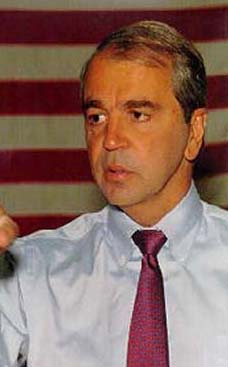Hardball Transcript: RPCV Chris Matthews leads the debate on the Peace Corps and the Military Option on Hardball
Peace Corps Online:
Peace Corps News:
Special Reports:
August 2, 2005: Headlines: Speaking Out: Military: Intelligence Issues: Washington Post: Peace Corps Option for Military Recruits Sparks Concerns :
Hardball Transcript: RPCV Chris Matthews leads the debate on the Peace Corps and the Military Option on Hardball
RPCV Chris Matthews leads the debate on the Peace Corps and the Military Option on Hardball
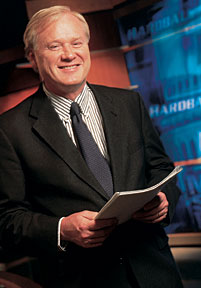
Television Journalist Chris Matthews served as a Peace Corps Volunteer in Swaziland in the 1960's.
RPCV Chris Matthews leads the debate on the Peace Corps and the Military Option on Hardball
MATTHEWS: Welcome back to HARDBALL.
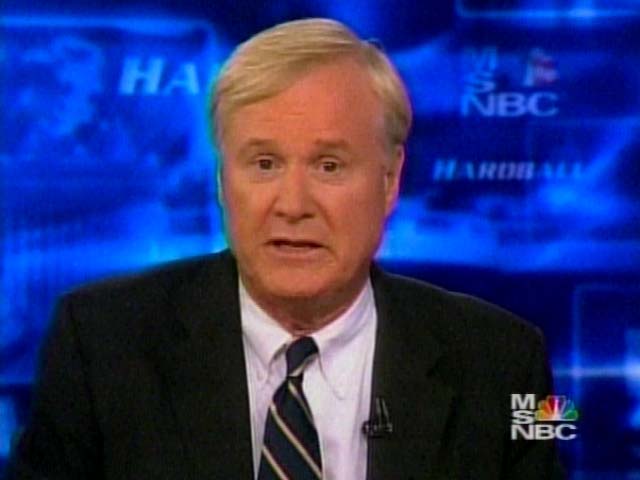
Since its founding in 1961, the U.S. Peace Corps has operated without any ties to the military and certainly no ties to our intelligence agencies, like the CIA. And that was by design. Peace Corps founder Sargent Shriver in fact appealed to his brother-in-law, President Kennedy, to keep the Peace Corps independent.
But now service in the Peace Corps is an option for military recruits. They can apply to serve the nonactive duty part of their military obligation in the Peace Corps, if they get accepted. So, what‘s wrong with that? A lot, says former Peace Corps volunteer Mark Schneider, who ran the organization from 1999 to 2001. Former Defense Department official Frank Gaffney disagrees.
Mark, what is wrong with letting service people, men and women who have signed up for, say, eight years in the Reserves, to spend the last couple years, if they get in, in the Peace Corps?
MARK SCHNEIDER, FORMER PEACE CORPS DIRECTOR: The main problem is that it undermines the independence of the Peace Corps.
As you noted, ever since the Peace Corps began, not only President Kennedy from the outset, but every secretary of state since and every president since, Republican and Democratic, have issued executive orders and sent cables to the field, saying the Peace Corps shall be independent of day-to-day foreign and security policy. And this blurs the line in a way that not only endangers the legacy of the Peace Corps, which has been very successful, but, unfortunately, also, to some degree, endangers volunteers.
You want to keep these institutions separate. You want to keep the Peace Corps...
MATTHEWS: Excuse me. You rang a bell there, having been a volunteer back in the ‘60s. How does it endanger volunteers...
SCHNEIDER: Well...
MATTHEWS: ... to have some former service people involved?
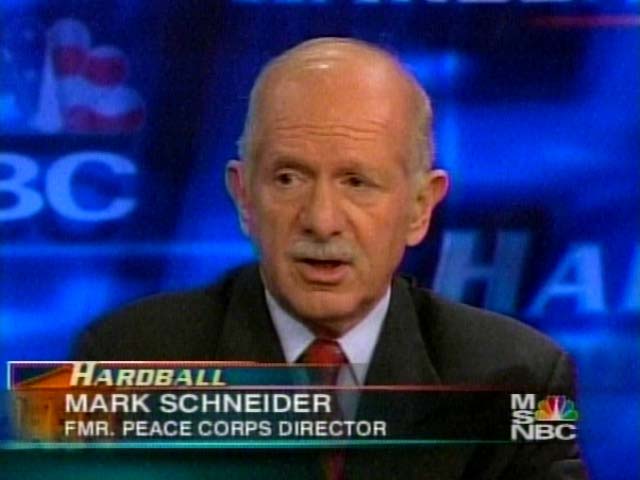
SCHNEIDER: Unfortunately, right now, there‘s a—a sense that there‘s a growing anti-Americanism in relation to Iraq, other reasons. If you—if it is known that Peace Corps volunteers, in a sense, are part of the military, in the sense that they‘re serving out their military obligation, that could in fact endanger volunteers. That‘s one of the reason why we‘ve always kept it separate and why the secretary of state has issued orders that you should not in fact try and use the Peace Corps for normal foreign policy reasons.
MATTHEWS: Frank Gaffney, you think it is OK to have military people use part of their service, if they get into the Peace Corps, to use it in the Peace Corps?
FRANK GAFFNEY, FOUNDER & PRESIDENT, CENTER FOR SECURITY POLICY: Well, I approach it from a different perspective. And I will put that up front.
We‘re in a war. The war we‘re in is going to require us for the foreseeable future to have capable people that are properly trained and properly equipped. Of those three, probably the most important I think is the people. Inducements to service in an all-volunteer force in time of war are going to become increasingly creative.
And this was one that was introduced three years ago, I think, by Senator John McCain and Senator Evan Bayh as a device for trying to make military service more attractive to some people who would like to participate in the Peace Corps.
MATTHEWS: Right.
GAFFNEY: That is, I think, an important idea and an important initiative.
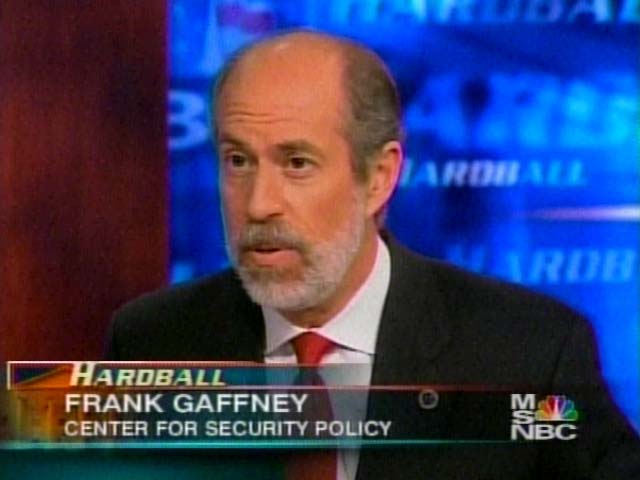
GAFFNEY: Obviously, in this war, you also want to be able to bring other tools to bear. And those tools can include diplomacy. They can include economic or financial tools. They can include intelligence. The Peace Corps has a role to play in that. It, too, wants the best people it can get. I‘m reasonably sure some of those are going to be excellent military veterans. And I hope, and believe, that that can be accomplished without undue cost to either the corps or its personnel.
SCHNEIDER: There is a way to do it, which is to say that the military service is military service. You finish your military service and then you apply like every other American for entering the Peace Corps.
MATTHEWS: But that‘s the way it now.
SCHNEIDER: That‘s the way it now. That‘s the way it should be.
MATTHEWS: Why don‘t—why don‘t you just say to a guy—you want to be induced people to join the military? You don‘t have to go in for the full eight years. Go in for six. That‘s an inducement. After you‘ve done your six, join the Peace Corps.
Why do you have to include it as part of the package?
GAFFNEY: I think the idea was to get people to come in for the full stint. If you do indeed...
MATTHEWS: But why would you—why would you want to—is the Peace Corps having problem—problems recruiting people?
GAFFNEY: I‘m talking about the military having problems recruiting people...
MATTHEWS: But why would a person in the military want to be—wouldn‘t it be better inducement to say, you have only got six years to serve, if you want to do six?
GAFFNEY: Conceivably. I think the way...
MATTHEWS: That‘s a better deal than you got to do eight and spend two in Africa.
(LAUGHTER)
GAFFNEY: The way it‘s been structured is to give them that as part of an overall package of eight. But, look, I think...
MATTHEWS: Let me look at...
MATTHEWS: ... the point of view of having been in there.
I want to ask you the question. You‘re a reasonable person.
GAFFNEY: Thank you, Chris.
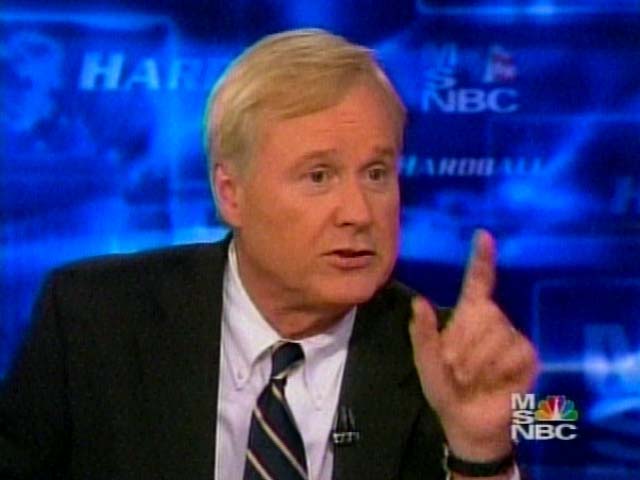
MATTHEWS: If a person is sitting over there in Africa and they‘re a person who is, say, in Swaziland, where I served back in the ‘60s, and a guy comes up—I‘ll tell you what happened to me. I was over there and a guy came up—I was kidding around with a friend of mine over there in Swazi. And I said, you know, of course, I‘m CIA, laughing. He says, never joke about that. That‘s not funny. And here‘s a guy that thought the pope was in Rome—I mean, in London. He didn‘t know much about the Western world. But he knew the CIA was bad. And isn‘t it the same problem?
MATTHEWS: I don‘t want to make your argument.
SCHNEIDER: It is the same problem.
MATTHEWS: I just know, from personal experience, that if there‘s any doubt about why you are or who you are—because all you are is some guy from America and that you look different, in many cases. You talk different. And they go, now, who is this guy that‘s come to teach me, in my case, business? And what is he really up to? Is this a cover? Is he really—did he kill anybody in Iraq?
I mean, there‘s like a case. Do you want guys who have actually been in combat to be in some other country and let them all know you were in combat in Iraq? Do you think that‘s work...
GAFFNEY: I certainly want to preclude people who are...
MATTHEWS: Would you think that would be healthy?
GAFFNEY: ... people who are otherwise qualified.
MATTHEWS: I don‘t know.
GAFFNEY: No, you asked me a question.
I wouldn‘t preclude veterans who have served their country in difficult places from serving their country in other ways, if they‘re qualified.
MATTHEWS: If they‘re out of the military?
GAFFNEY: Well, I think that‘s a question that ought to be addressed.
MATTHEWS: But you told me before you came on that you can still be called back. So, you‘re over serving in Kenya somewhere.
MATTHEWS: You could be—so, a guy—so, a guy who is working with you over there, a local ministry person from the ministry you‘re working for, knows the whole time you‘re over there that you can get yanked back into the military. So, he always sees you as a...
GAFFNEY: Under very extreme circumstances.
MATTHEWS: But he always sees you as a military type, doesn‘t he?
GAFFNEY: Under—I don‘t know. I don‘t know.
GAFFNEY: The question—the question of whether that is a problem ought to be addressed.
MATTHEWS: Mark, is that a problem?
SCHNEIDER: That‘s a problem. It is not only a problem for that individual.

SCHNEIDER: The problem is for all the other volunteers that are going to be thought of as potentially still in the military who have nothing to do with the military. And what you‘re doing there is, you‘re endangering the Peace Corps, which is, long term, in the interests of the United States, is providing people around the world with the knowledge about who we are as a people.
It is in a sense doing what you talk about, in terms of fighting the war on terrorism by letting other countries know who we are. And you‘re endangering that for a very few number of people who might...
MATTHEWS: Here‘s one I would want. If I were a military guy, I would not take this option.
Suppose you‘re over there fighting, risking your life for your country for a couple years in Iraq and you‘re involved in combat. You‘re really in it. And you‘re killing people. You‘re being shot at. It is horrible. The word gets out that you‘re now serving in Timbuktu somewhere all by your lonesome out in the middle of some bush somewhere, with nobody around you, no guns, nothing, no protection.
And they know you‘re over there. It‘s not hard for them to figure out where our guys are, that you were—do you think you would like to be stuck out there all by yourself without a gun, stuck in the middle of Africa?
MATTHEWS: That any time an al Qaeda guy wanted to go pick you off, they could do it with impunity?
GAFFNEY: Look, I...
MATTHEWS: Wouldn‘t that be a problem for you?
GAFFNEY: I—it might be a problem for me. And it might be a problem for everybody else, in which case this is a moot point.
MATTHEWS: Yes.
GAFFNEY: But the question is, if it‘s not, if some guys would like to opt for this, they still have to go through all of the rigmarole...
MATTHEWS: Sure.
GAFFNEY: ... that gets you into the Peace Corps. But if they want to do that, Chris, it seems to me, they shouldn‘t be denied the opportunity to do it.
MATTHEWS: OK. Let me ask you a question.
GAFFNEY: And your question as to whether or not there ought to be an amendment to the law that gets them out of the military...
GAFFNEY: ... reasonable question to debate.
MATTHEWS: I think it would be great.
MATTHEWS: First of all, I think...
GAFFNEY: What I would just ask...
MATTHEWS: ... military guys, with their training, should join the Peace Corps when they‘re done. I think it would be great. That‘s a totally different story.
GAFFNEY: Well, but they got the same problem that you just posed.
They could conceivably have the same problem.
What I would still ask is, we are going to have to come to grips as a nation with the problem of meeting the needs of the military in a wartime environment.
SCHNEIDER: Sure, but don‘t destroy the Peace Corps to do it.
GAFFNEY: I‘m not suggesting that you do. And I‘m not sure this would.
But we do need to have that debate, too. And this may not be the fulcrum on which it turns, but I think it is part of the larger debate we have to have.
MATTHEWS: You could promise them they could go to Harvard for the last two years. You can make all kinds of promises.
GAFFNEY: That could be even more dangerous than Tanzania. Who knows?
SCHNEIDER: No, the problem is not only with these individuals. The problem is the rest of the volunteers serving, who are going to be put into this same basket or could be by somebody who wanted in fact to take advantage of the argument that they‘re in the military.
MATTHEWS: Last question. Do you think the existing Peace Corps rules that says you can never have served in an American intelligence agency before serving in the Peace Corps is a good rule?
GAFFNEY: I don‘t know whether it is in fact implemented.
SCHNEIDER: It is.
GAFFNEY: I would assume—I would assume that the same basic principle applies as the one that‘s just been laid out here.

MATTHEWS: But do you think it is problem—do you think is OK for intelligence spooks to go work in the Peace Corps?
GAFFNEY: Personally, we need human intelligence everywhere. And I wouldn‘t use anybody‘s cover inappropriately, but there may be certain cases where it is...
MATTHEWS: If anybody gets idea that Peace Corps guys are CIA, they‘re dead.
SCHNEIDER: And let‘s be clear that there has been executive orders issued by every president—by every president...
GAFFNEY: You were joking about it.
SCHNEIDER: ... by every president not to have...
MATTHEWS: I shouldn‘t have.
SCHNEIDER: ... not to use the Peace Corps in any way. And it has not been done. The point...
MATTHEWS: You‘ve never heard—I‘ve never heard of a Peace Corps volunteer ever involved with the CIA.
MATTHEWS: Have you?
GAFFNEY: I‘m not suggesting that they are.
MATTHEWS: Have you ever heard of any connection?
SCHNEIDER: Not that I know of.
MATTHEWS: OK.
GAFFNEY: You asked a hypothetical question.
GAFFNEY: I‘m saying I‘m not sure I would rule...
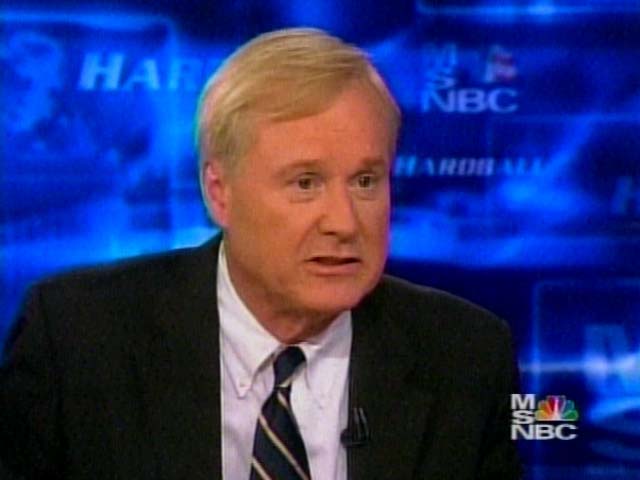
MATTHEWS: I think the reason we—I think we should always be able to answer it negatively.
SCHNEIDER: Exactly. And every president has in fact established a rule that they may not. And it has never been violated.
MATTHEWS: No Valerie Plames in the Peace Corps.
Anyway, thank you.
GAFFNEY: Guess not.
MATTHEWS: Mark Schneider.
And, thank you, Frank Gaffney.
GAFFNEY: Nice to see you, Chris.
SCHNEIDER: Thank you.
MATTHEWS: Up next, did Bob Novak pull a Howard Beale last night on
CNN?
This is HARDBALL, only on MSNBC.
When this story was posted in August 2005, this was on the front page of PCOL:





Peace Corps Online The Independent News Forum serving Returned Peace Corps Volunteers
 | The Peace Corps Library
Peace Corps Online is proud to announce that the Peace Corps Library is now available online. With over 30,000 index entries in 500 categories, this is the largest collection of Peace Corps related stories in the world. From Acting to Zucchini, you can find hundreds of stories about what RPCVs with your same interests or from your Country of Service are doing today. If you have a web site, support the "Peace Corps Library" and link to it today. |
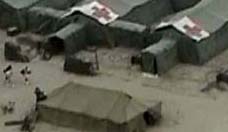 | Military Option sparks concerns
The U.S. military, struggling to fill its voluntary ranks, is allowing recruits to meet part of their military obligations by serving in the Peace Corps. Read why there is rising opposition to the program among RPCVs. Director Vasquez says the agency has a long history of accepting qualified applicants who are in inactive military status. John Coyne says "Not only no, but hell no!" Latest: RPCV Chris Matthews to discuss the issue on Hardball tonight. |
 | Friends of the Peace Corps 170,000 strong
170,000 is a very special number for the RPCV community - it's the number of Volunteers who have served in the Peace Corps since 1961. It's also a number that is very special to us because March is the first month since our founding in January, 2001 that our readership has exceeded 170,000. And while we know that not everyone who comes to this site is an RPCV, they are all "Friends of the Peace Corps." Thanks everybody for making PCOL your source of news for the Returned Volunteer community. |
Read the stories and leave your comments.

Some postings on Peace Corps Online are provided to the individual members of this group without permission of the copyright owner for the non-profit purposes of criticism, comment, education, scholarship, and research under the "Fair Use" provisions of U.S. Government copyright laws and they may not be distributed further without permission of the copyright owner. Peace Corps Online does not vouch for the accuracy of the content of the postings, which is the sole responsibility of the copyright holder.
Story Source: Hardball Transcript
This story has been posted in the following forums: : Headlines; Figures; COS - Swaziland; Journalism; Television; Safety and Security of Volunteers; Military; Intelligence Issues
PCOL21573
63
The idea of people fulfilling their military service by serving in the Peace Corps scares the hell out of me. First of all, there is a different mindset in the military compared to the Peace Corps. I have known some wonderful military men over the years, but they were compromised if they did not give full attention to the fact that they were the fighting force of our nation. The Peace Corps has succeeded because it takes exactly the opposite view -- we keep away from any political agenda, especially force. Thus, both sides would be compromised if soldiers tried to serve two masters.
Secondly, this is an attempt to make the present military structure look as though it is attracting more people than it is. Instead of fixing the problem, the government is trying an "end run" to make us believe something that isn't. Like weapons of mass destruction, and a "coalition" of concerned nations. This is an idea that is doomed to failure, and is going to cost the nation and the Peace Corps whatever respect remains.
|
By Anonymous (207.42.104.161) on Thursday, August 11, 2005 - 3:19 pm: Edit Post |
An important aspect of soldiers serving in the PC has been overlooked. As volunteers we do not receive all the benefits a soldier receives. We receive a very little stipen, no real funds for education and no GS-#. So the playing field will not be level anymore within the volunteer ranks. I imagine the soldiers will still recieve their monthly pay while other volunteers may be struggling to live on what they make. Is it fair to treat volunteers differently because of their past job status?
It's totally out of the question. It would destroy 40 something years of trust and intergrity. That many of us returing volunteer worked so hard to build.
Is'nt 400 billion dollars spent on security enough to placate the industrial war cows.
Must they now scarfice Peace Corp too, and turn it into a second class spy ring op.
I proudly served 4yrs in SA and I can tell you when you look into a set of angry eyes claiming that you are CIA and you can calmly look back and say to them in total honesty, "NO".
That little didy save my butt on many occasions.
Don't destroy the only descent World Wide recognized US organization that is respected.
The world knows all the other AID organizations are chuck full of CIA types. Only PC stood out as being clean.
Money talks and spooks talk but PC volunteers are the real heroes, who worked without guns and big military hardware to protect them. Just their simple belief in making the world a better place to live in. Protected them from all the political nuts there and here.
So it's time to stand up and tell the spooks we don't what you, don't need you in our outfit.
Once PC is compromised as a spook agency we would be sitting lambs for psycho religious or political nuts. I speak from experience where does Mr. ?? security speak from. When was he in harms way, and especially by himself, alone. I doubt it. There was a valid reason for the shrink test back in the sixites. It was to see if you could cope with the aloneness in a healthy way. Not the parnoia that is needed for spooking. Speak up for PC don't let them ruin our reputation.
Do they think PCV's are gonna find the "WEAPONS of MASS destruction for them???????????
|
By John Bernard, RPCV 66 (pool-151-197-33-127.phil.east.verizon.net - 151.197.33.127) on Friday, August 12, 2005 - 8:24 am: Edit Post |
Anybody out there remember the military draft? It was the way we built a military force in the United States and is still used in many countries of the world! At the time I became a PCV in 1966 (Ag Reform/Venezuela)many draft boards were giving deferments to those serving in the Peace Corps. Some were even completely exempting those who served in the PC from any further military service. I was given a deferment and eventually did not serve in the military because of medical reasons. It was my belief--and still is--that we make our way in this world by our own merits, sometimes recognized and sometimes not. My experience in the Peace Corps molded and verified that belief. More than once I was considered a CIA operative and even a spy during my tenure as a volunteer in rural Venezuela. I mean, after all, who in their right mind would give up 20th century comforts to live with people who's median income was $40 a month without some hefty compensation being put away in a bank back in the US! Unless the selection of Peace Corps Volunteers has been changed drastically over the years or would be changed under this new proposal, then what's the issue? When I was going through the selection process, it was my understanding that only 25% of those who applied actually made it into PC service once the process was completed. That included peer selection which took place during our training.
As a nation, we need to leave the comforts of our society and see how the rest of the world lives, not on cruise ships that stop briefly at world ports, spring breaks in Can Cun, hiking trips to watch humming birds in Costa Rica, etc.! And miltary service is not the way either. A uniform can trigger too many confused reactions, though their presence can be a comfort as well. There's no substitute for living with people daily, and the Peace Corps gave me that opportunity. As most any RPCV will tell you, they were the ones who learned the most from the PC experience--and I am among them.
|
By Dan Miller (ip-200-53-106-124-mty.marcatel.net.mx - 200.53.106.124) on Friday, August 12, 2005 - 12:00 am: Edit Post |
In another post I made the point that the PC has a history of trying to remain independent so that it could do its job while Defense and State have been trying to coopt PC for their own purposes. A perfect example is the following quote from Mr. Gaffney.
" Inducements to service in an all-volunteer force in time of war are going to become increasingly creative...I‘m talking about the military having problems recruiting people."
If this doesn't scare you, it certainly should. Here is a member of the military trying to coopt PC for his own purpose and if you read his statements it is obvious that he really doesn't care about PC's program and goals. What he wants is to use PC as a recruiting arm for the military, an objective that is against everything that PC stands for.
I enjoyed the discomfort he showed when it was suggested that it would be more effective to reduce the time to six years instead of eight than to add PC to the pot. As I said before and as has been mentioned above, a discharged serviceman is entirely as welcome as anyone else, but despite Gaffney's statement, it is not the same as what he is trying to do. A discharged service man who joins the PC is trying to put his past behind him, not remain part of the military.
I believe that having people join the Peace Corps to fill their military obligations will endanger the safetry of our volunteers everywhere. There is a strong belief among the citizens of many nations that Peace Corps volunteers are secretly working for the CIA. Of course, when I was in Africa for a total of 5 years (2 years PCV, 3 yrs other) I denied that supposition vehemently. I'm not sure if they believed me then but how on earth will they believe us now if members of our military openly join the Peace Corps.
Debbie Lowe - Niger '81
I believe that having people join the Peace Corps to fill their military obligations will endanger the safetry of our volunteers everywhere. There is a strong belief among the citizens of many nations that Peace Corps volunteers are secretly working for the CIA. Of course, when I was in Africa for a total of 5 years (2 years PCV, 3 yrs other) I denied that supposition vehemently. I'm not sure if they believed me then but how on earth will they believe us now if members of our military openly join the Peace Corps.
Debbie Lowe - Niger '81
|
By Anonymous (quebec-hse-ppp238318.qc.sympatico.ca - 69.159.234.54) on Friday, August 12, 2005 - 7:39 pm: Edit Post |
I completely agree that making this kind of change is both outrageous and would put current PCVs in higher danger as well as create two-tiered volunteers. I don't hate anyone but the DOD and State Dept need a clear signal to stay out. If this idea went ahead I would be tempted to make a special trip to Washington to see my Rep and Senators and bend their ear and ask my PCorps and military friends to do the same. PCorps is not some military recruiting tool. Obviously.
I wrote a column on this topic:
"The Toughest Job You'll Ever Love...just got a little tougher, thanks to some help the U.S. Peace Corps didn't need."
Find it at The Wild Duck:
http://www.wildduckdiary.com/?p=93
The following exchange I found most chilling. Frank Gaffney was a Department of Defense offical during the Reagan administration. Read closely what he says. Matthews should have followed up and did not.
MATTHEWS: Last question. Do you think the existing Peace Corps rules that says you can never have served in an American intelligence agency before serving in the Peace Corps is a good rule?
GAFFNEY: I don‘t know whether it is in fact implemented.
SCHNEIDER: It is.
GAFFNEY: I would assume—I would assume that the same basic principle applies as the one that‘s just been laid out here.
MATTHEWS: But do you think it is problem—do you think is OK for intelligence spooks to go work in the Peace Corps?
GAFFNEY: Personally, we need human intelligence everywhere. And I wouldn‘t use anybody‘s cover inappropriately, but there may be certain cases where it is...
|
By Anonymous (64.78.229.194) on Wednesday, August 24, 2005 - 11:12 am: Edit Post |
Of course it's outrageous, as are the views of Chris Matthews. Through our service most of us developed greater respect for other cultures and ideas, and we saw the problems of concentrated power and wealth. Chris Matthews is a spokesman for this administration and their unbridled lust for wealth and power. These are my highly restrained comments.
|
By MajorOz (ppp033.man.centurytel.net - 64.91.46.111) on Monday, August 29, 2005 - 7:16 pm: Edit Post |
Denis Nolan said, on 11 Aug:
"The Peace Corps has succeeded because...we keep away from any political agenda...".
Denis,
You must be from out of town. I'll bet you think that PC stands ONLY for Peace Corps.
cheers
oz, RPCV and USAF, ret. (not in that order)















